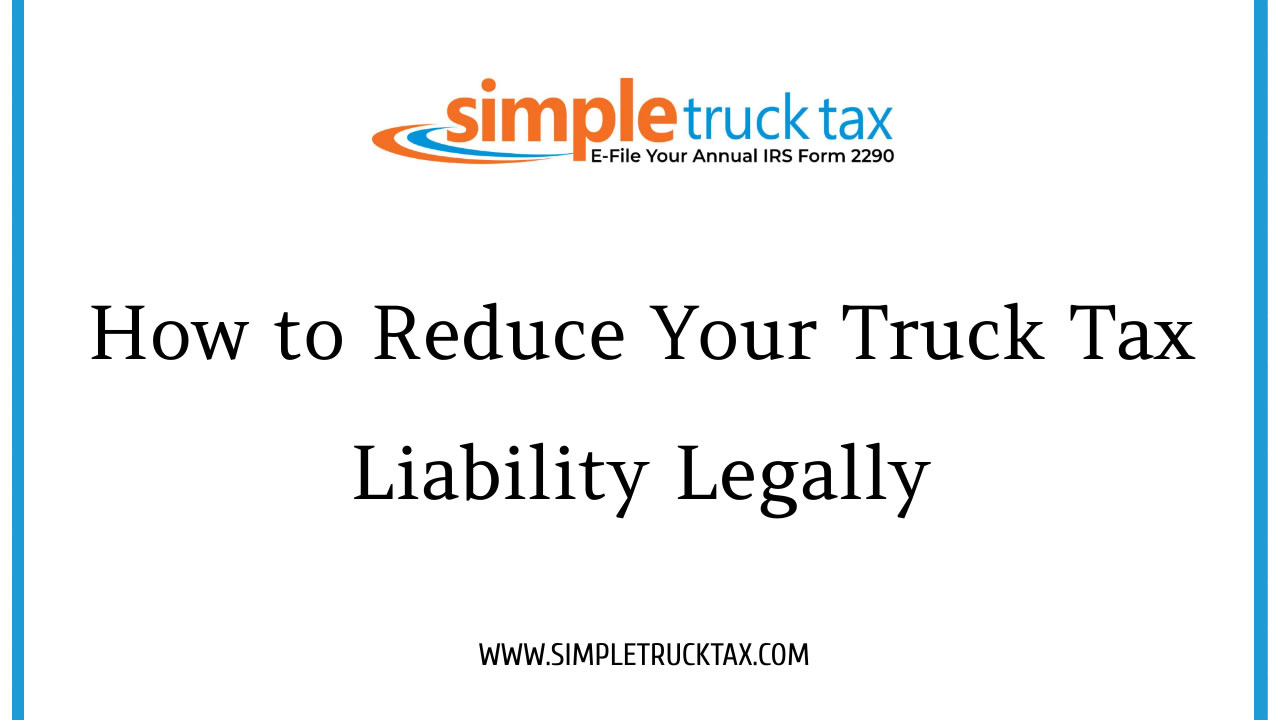
How to Reduce Your Truck Tax Liability Legally
Legally Minimizing Your Truck Tax Liability
Tax management is fundamental for any trucking business. For a fleet owner or an owner-operator legal minimization of truck tax liability maximization of profit margins and compliance within the bounds of the law. Outwards, we have a look at measures that you can employ to lower your truck tax liability while still ensuring that your financial position does not get compromised.
Utilize Tax Deductions
Tax deductions available to the trucking sector are critical truck tax liability minimization strategies. Some of them are:
- Cost of Fuels: The amount incurred in purchasing diesel or petrol for the trucks can be deducted.
- Truck Repairs and Maintenance: Costs for replacing tires, as well as maintenance and repairs are often surprisingly large and are deductible.
- Tax Depreciation: Your truck depreciates over its used life and value according to IRS rules can be written off.
- Meals and Accommodation: Where a truck driver is away from home or away from the workplace overnight, some expenditure for meals and accommodation may be written off.
- Insurance Premiums: Deduct this as revocation section insurance expenses for commercial trucks are a tax write off.
You must have proper receipts in place to support all these expenses in order to facilitate your tax returns.
Correct Use of Tax Documents
Using the correct tax forms enables you in seeking repayment of amounts that you have over paid.
Heavy highway vehicle operators and owners need to submit and complete a tax form 2290 if they own a vehicle with a weight of more than 55000 pounds.
Strategies to make the tax form filling smooth:
- While completing the E-filing of Form 2290, the filing of the complete document becomes faster and error-free.
- According to the IRS, when a truck is driven less than 5,000 miles in a year, this can lead to the vehicle being provisioned for a tax suspension, and for agri activities it is less than 7,500 miles.
- For vehicles that were sold, destroyed, or stolen, attach Form 8849 to the claim for refunds.
Purchase Electric or Carbon Emission-Free Trucks
Anticipating the purchase of electrically powered trucks will not only lessen the expenditure that comes with the supply of a vehicle but will also be able to entitle you to tax credits. Utilize the Alternative Fuel Tax Credit and make these greener approaches benefit you financially.
- Detailed in Section 179 Deduction, this kind of deduction allows for the complete write off for the cost of any equipment that qualifies in the year it was purchased.
- This depreciation is advantageous in that it speeds up tax deductions on brand new trucks that were recently used.
- This will enable you to recover the high cost of purchasing the environmentally friendly fuel efficient automobiles.
Take Per Diem Expenses on Your Taxes
There are per diem expenses advantages considering the IRS offers them for owner operators for providing them with basic meals as well as a few others while they are traveling for work-related reasons.
Utilizing the per diem rate makes tracking expenses easy while guaranteeing that you do not miss out on getting maximum deductions.
According to the IRS:
- Per day meal allowance in the US is pegged at rate of $69.
- Make sure to file logs of all your journey that would make you eligible for this deduction.
Work with a Tax Professional
Understanding tax laws can be quite hard especially for the trucking business. A CPA or tax professional with extensive knowledge of the trucking business can:
- Consider telling you about the other expenses that you could claim but aren’t known to you.
- Make certain you are in accordance to the IRS to avoid penalties.
- Recommend helpful suggestions that would suit your business while paying the least amount of taxes legally possible.
Take Advantage of State-Specific Incentives
Some states provide incentives for companies operating as truckers in their state. For instance;
- Fuel Tax Credits: Some states have a rebate on fuel bought within that state.
- Weight-Distance Tax Exemptions: Certain states also have added exemptions based on weight and distance ranges.
Every state has its own tax structures and policies which might give you an added benefit.
Keep Accurate Records
Proper and clean auditing is necessary so that you can claim the deadlines and even be left alone by the tax authorities. Some of these records will include:
- Fuel purchase slips, records and other log types.
- Invoices of any repairs or maintenance done on the truck.
- Receipts for any paid tolls.
- Mileage logs
This and other paperwork can be made easier by using accounting programs that are specific for trucking.
This could have resulted in a legal decrease in tax on the truck. In the same way, it can be done by working to some extent with tax- regulator authorities. The tax professional puts all energy to maximize deductions, tax credits and investing in energy-efficient trucks aiming to minimize tax expenses.
Make the necessary adjustments now in order to optimize all profits from trucking as well as to survive in the business for future!
Note: For more information, visit IRS website